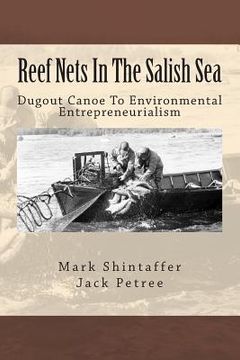Reef Nets In The Salish Sea: Dugout Canoe To Environmental Entrepreneurialism (en Inglés)
Reseña del libro "Reef Nets In The Salish Sea: Dugout Canoe To Environmental Entrepreneurialism (en Inglés)"
The Straits Salish Indians of the San Juan and Straits of Georgia's islands were using an advanced technique to catch sockeye salmon hundreds of years ago; probably before Columbus, Vespucci, Bering, Drake and other European explorers were even born. That technique survives today and is considered to be one of the most environmentally sensitive of all the methods of catching fish. The indigenous peoples we now know as the Lummi, the Samish, the Semiahmoo, the Sooke, the Songish, and the Saanich, were a distinct group particularly distinguished by their invention of, and use of, an ingenious apparatus known today as the reef net; an apparatus especially designed to catch the elusive sockeye salmon. This book tells the story of the reef net as invented by an unknown genius among the Straits Salish peoples of hundreds of years ago. This book is also an attempt to examine the lessons to be learned from the past and their potential for informing the future; what can we learn from the past to enhance our approach to the future? The lessons of the reef net include respect for a people capable of developing an advanced technology based on the natural world they lived in. The lessons of the reef net lead to an increased respect for the environment. The lessons of the reef net include material for reflection about the value of self-reliance and an entrepreneurial spirit. The lessons of the reef net have much to teach about the value of community and people working in a common cause. Invented hundreds of years ago, the reef net is still in use today. According to the Washington State Department of Fish and Wildlife: "The term, selective fishing, has been used to describe any of several fishing gears and management objectives, yet at its most basic definition a selective fishery is one in which by catch (the capture of undesired species) is avoided altogether or is able to be released alive and unharmed. As the Department of Fish & Wildlife has experimented with selective commercial fishing gear and moved toward selective fishing practices in recreational fishing, reef nets stand out as the original and still the best in selective fishing. Practiced by the Indians of the Puget Sound region using materials gathered locally, reef nets are unique to the area. Modern materials and hydraulics have improved efficiency but the basic methods remain the same. Reef nets do not gill or surround salmon with a net. Rather they count on natural and manmade structures to lead the salmon into a shallow laid net which is then lifted and the fish spilled into holding pens. Minimal handling and stress coupled with the ability to keep the fish alive make reef nets the most selective fishing gear available. Reef nets are fixed to one location and only catch migrating adult salmon that swim through their gear. For years reef nets have released non-target salmon species when management needs dictate. Mortality and bycatch are lower than any other fishing gear. Today reef nets are used in northern Puget Sound, targeting sockeye and pink salmon during summer months and coho and chum salmon during the fall."

